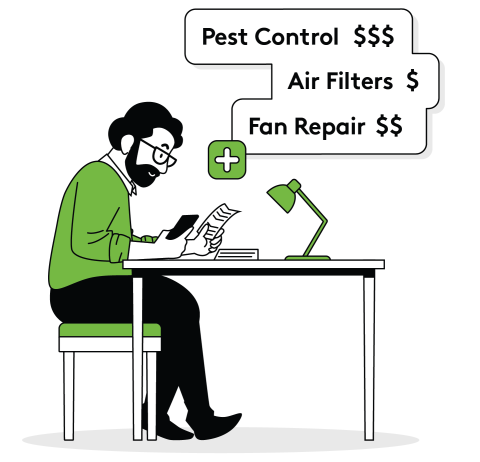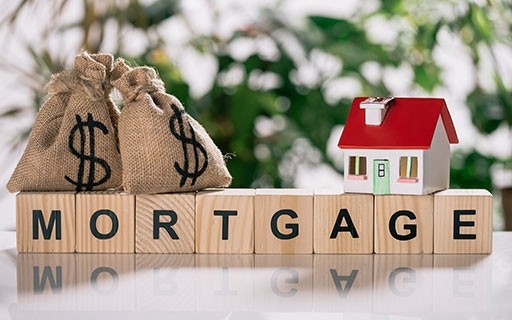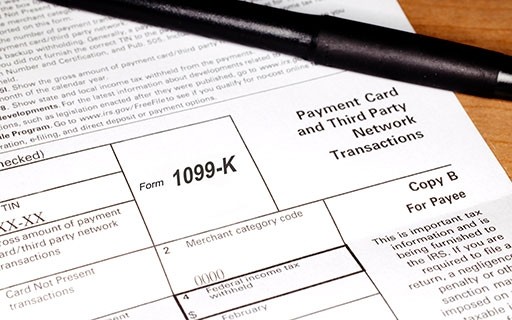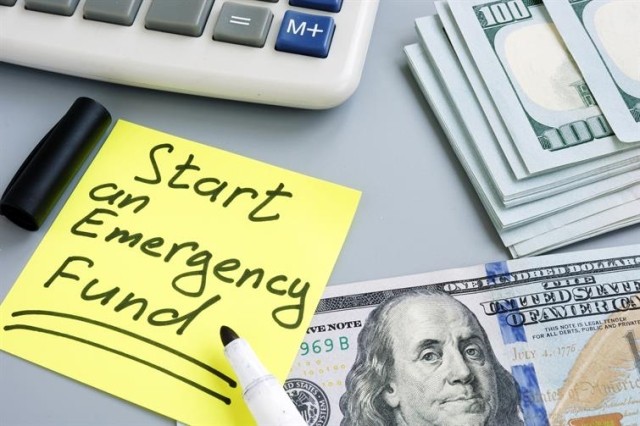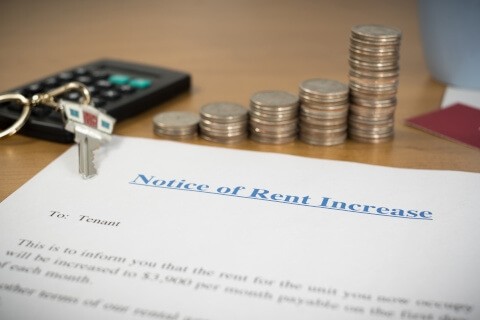
Key Takeaways
- Landlords should budget for various expenses like maintenance, taxes, and insurance.
- Landlord insurance protects you in case of property damage or financial loss, while requiring renters insurance can safeguard tenants’ belongings.
- Landlords can take advantage of tax deductions for necessary expenses like mortgage interest, maintenance and repair costs, and property taxes from their taxable income to increase their tax return.
- Apartments.com can simplify property management by helping you track and manage the costs of owning a rental property.
Renting out your property is so much more than finding tenants and collecting monthly rent. Your property is going to need consistent upkeep to remain attractive to renters. Understanding the financial implications of renting out property before you invest in a rental property is crucial to set yourself up for success.
11 Common Rental Property Expenses
If you’re new to the world of property management, here are some rental property expenses to plan for:
- Home inspection costs
- Appraisal fees
- Closing costs
- Mortgage payments
- Permitting
- Landlord insurance
- Marketing your rental
- Tenant screening
- Routine maintenance
- Emergency maintenance
- Property and income taxes
Home inspection costs

A home inspection is an absolute necessity to protect yourself from buying a property with serious problems like foundation and structural issues, plumbing leaks, electrical gremlins, and more. Most home inspections will cost you around $200 to $500, depending on the size and location of your property.
Appraisal fees
Your soon-to-be rental must be assessed for its actual value before the mortgage company agrees on the amount of money to lend you. Sometimes your home appraisal fee may be covered in closing costs, but it typically isn’t. The cost of an appraisal depends on your property’s size and location, but appraisals for single-family homes tend to be around $400 to $800.
Closing costs
Closing costs are expenses beyond the down payment that occur when the property title is transferred from seller to buyer. Closing costs cover things like title insurance and a credit report fee and are typically around 2-5% of the property’s purchase price.
Mortgage payments
Securing a mortgage for an investment property is different from securing a mortgage for a primary residence. Lenders view rental properties as a riskier investment and will typically require a larger down payment and higher interest rates. According to Experian, mortgage rates for a rental property are typically 0.25% to 0.875% higher than those for a primary residence.
Permitting
In some states, you may be required to obtain a certain type of permit or business license if you plan on renting out your property. Make sure you check your state and local laws to be sure you’re following the proper ordinances, and budget for the application fees and time spent on getting your rental in the proper legal standing.
Landlord insurance
You’ll need landlord insurance if you plan on renting out your property for an extended period of time. Landlord insurance protects you financially in case of property damage, financial loss, or liability. According to ValuePenguin by Lending Tree, landlord insurance is about 25% more expensive than homeowners insurance, putting the national average around $1,895 annually. The upfront cost may be daunting, but a landlord insurance policy can save you money in the long run.
Landlord insurance does not offer the same protections as renters insurance and will not protect your tenants’ personal property in case of emergencies. It’s a good idea to require renters insurance in your lease in addition to purchasing landlord insurance for yourself.
Marketing your rental

Once your property is tenant-ready, you’ll need to get the word out. There are cost-effective ways to advertise your property, but investing in a Premium listing on Apartments.com can get you up to nine times more views and three times more high-quality leads.
How much you spend on advertising your rental depends on your property type and the local market conditions, but Fourandhalf recommends allocating 3-7% of your annual rental income for advertising.
Tenant screening
Conducting a background and credit check is crucial to finding top-notch tenants. Screening applicants can weed out renters who don’t pay rent on time and cause property damage, helping you choose the best tenant.
You can eliminate this expense by listing your rental on Apartments.com. Apartments.com makes it easy to screen tenants for free and get the information you need to find a qualified renter fast. We partner with TransUnion to provide you with comprehensive reports about an applicant’s rental, credit, and criminal history.
Routine maintenance
Routine maintenance is important to keep your property in good shape and to maintain a good landlord-tenant relationship. Changing the HVAC filter, cleaning the gutters, and pest control are common practices that can extend your property’s life and prevent expensive repairs.
How much routine maintenance will cost depends on your property’s age, type, and location, but Forbes recommends setting aside $1 per square foot of your property for annual maintenance costs.
Emergency maintenance
The best-laid plans often go awry, and maintenance is no exception. You can’t predict the AC unit dying in the middle of summer, the furnace cutting out in the dead of winter, or a burst pipe that needs to be dealt with.
As a landlord, it’s your duty to maintain the facilities you supply, so it’s wise to build some room into your budget for emergency maintenance. Start by assessing the cost of every appliance on your property, including out-of-sight equipment like septic tanks and garbage disposals.
Property and income taxes

It’s important to understand a rental property’s tax implications for landlords. Since you own a property and earn income from it, you’ll pay both property and income taxes on your rental. Property taxes will vary by city and state, so research property tax rates in your area.
How much you pay in income tax depends on how much rent you collect and how many deductions you claim. The IRS says that landlords can claim necessary expenses like mortgage interest, depreciation, insurance, maintenance, and even property taxes. Claiming tax deductions for these expenses will lower your taxable income from your rental property and increase your tax return.
How to Estimate Rental Property Expenses
Estimating and budgeting for rental property expenses is much more difficult than estimating rent. You can figure out a good rent price with our rent comps reports and ROI calculator, but getting an exact number for rental property costs is harder to pin down.
Start by contacting real estate agents, mortgage lenders, utility companies, and maintenance companies in the area to get quotes for closing costs, mortgage payments, utility bills, and maintenance costs. Contact your local tax commissioner to get an idea of what you’ll pay in property taxes each year.
Owning a rental property isn’t easy; it’s your job to maintain the livability of an entire home or apartment for someone else, and the legal and financial implications of renting out property can be dizzying. But if you can budget for the expenses that every property manager faces, you’ll be in a fantastic spot to handle the rest.
Apartments.com can make the financial aspect of property management easy. Listing your rental with Apartments.com gives you access to the Rental Manager suite, where you can view rent comp reports, collect rent, manage your expenses to maximize your rental income and focus on building a good relationship with your tenants.
This article was originally published on Sept. 29, 2020, by Jacob Margle.
